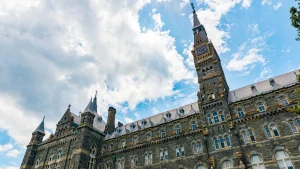Three Georgetown University government department professors discussed the significance of the recent U.S. Supreme Court ruling Trump v. United States (2024), which specifies the types of misconduct presidents can be prosecuted for, during a panel titled “The US Supreme Court and Presidential Immunity” and subsequent Q&A Sept. 9.
The panel came about after the Georgetown Office of Federal Relations requested that Anthony Clark Arend (SFS ’80), the chair of the government department, continue the office’s tradition of hosting a panel in honor of Constitution Day, which is Sept. 17. Featured speakers included Arend; Catherine Lotrionte, the director of the Institute for Law, Science and Global Security; and Joseph Hartman, an assistant teaching professor in the government department.
In the July Trump v. United States ruling, the Supreme Court ruled that former presidents have absolute immunity from criminal prosecution for official acts taken as president within their “exclusive sphere of constitutional authority.” The court’s decision prolongs the initial trial in former President Donald Trump’s federal election interference case, making it unlikely that Trump will stand trial before November’s presidential election.
Hartman said the case has been particularly controversial because it involves Trump.
“Trump is like a black hole and everything sucks into whatever Trump’s involved in,” Hartman said at the event.

Arend said the ruling’s complexity gives lower courts major responsibility to determine what counts as an “official act.”
“The decision is a mess, in part because it doesn’t decide very much. It leaves it up to the district courts to figure all this stuff out,” Arend said at the event. “What’s going to have to happen is you’re going to have to figure out what is within the core authority. How do we apply this presumption?”
Arend added that the case represents new legal precedent concerning presidential immunity.
“Trump v. U.S. is a landmark case for several reasons: First, it is the first time that the Supreme Court has addressed the issue of immunity from criminal prosecution for a former president,” Arend wrote to The Hoya. “Second, because the holding of the Court left so many specific issues undecided, there will likely be much continuing litigation to address the applicability of the ruling to particular claims of immunity.”
In the decision, six Supreme Court justices ruled Trump cannot be prosecuted for his conduct concerning discussions with the Department of Justice about fraudulent electors, as the president can only be prosecuted if the government can prove that prosecuting him would not interfere with the authority of the executive branch.
Contextualizing the ruling within Trump’s case, Lotrionte explained the feasibility of three hypotheticals which Associate Justice Sonya Sotomayor put forth in her dissenting opinion, which include ordering the U.S. Navy’s SEAL Team Six to assassinate a political rival, organizing a military coup to maintain power and taking a bribe in exchange for a pardon.
Lotrionte said any actions involving the military would likely not count as “official acts,” as the president shares the responsibility of regulating the military with the legislative branch.
“You’re thinking about commander in chief authority which, while it is executive branch authority, is not an exclusive executive branch authority,” Lotrionte said during the event. “Congress is very much involved with regulating the military. Therefore, one could argue this is not core presidential exclusive authority.”
“You start to understand that what the court decides might not be as concerning as Justice Sotomayor would say, that it might not be as extreme consequences for future presidents to become king,” Lotrionte added.
Elton Skendaj, the director of the university’s graduate program in democracy and governance and event attendee, said his decision to attend the panel and listen to the speakers was due to his interest in accountability and the rule of law.
“What is interesting to me is the broader question of presidential immunity, about whether our elected leaders can be held accountable and whether they are above the law,” Skendaj told The Hoya. “If they have unrestricted immunity about their actions, then this would mean that they’re actually above the rule. So we would no longer be a rule-of-law country.”
“It’s a work in progress and you can expect to see more clarification,” Skendaj added.
During the panel, Hartman said the justices who ruled with the majority may have viewed the case through the lens of evaluating the president’s ability to perform their responsibilities.
“It’s what I would call a functionalist decision. What I mean by that is the majority is looking at this and saying, ‘Okay, the presidency has to function,’” Hartman said. “In this regard, the president needs to be able to make tough decisions and get advice. And we don’t want presidents constantly worrying, ‘Wow, if I do this, am I going to be prosecuted later?’”
“Now I’m not saying therefore this is a valid decision, but my point is you’ll get so caught up in the facts around this,” Hartman added. “They said the point is that we’re writing a rule for the agency. I think they’re thinking less about Trump and more, ‘What’s this going to look like? What are we incentivizing? What structure are we putting in place?’ I think that’s ultimately where there’s a deep disagreement.”